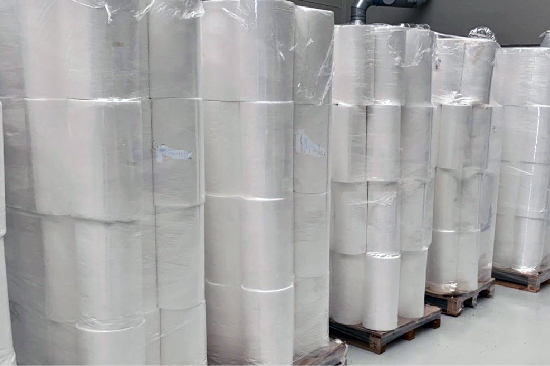
-
One of the objectives of the project is to obtain filters with FFP2 and FFP3 certification for biodegradable masks and respirators
-
Both disposable, washable and reusable masks may use these filters
A project of the Institute of Agrochemistry and Food Technology (IATA), a research centre of the Spanish National Research Council (CSIC), develops biodegradable and virucidal materials for reusable, highly protective healthcare devices. The research group that has carried out this work, led by the scientist José María Lagarón, has been very active since the beginning of the health crisis, together with the company Bioinicia S.L., in the development of filtering materials that can be integrated into masks. It is a project that has been approved by the CSIC's Global Health platform and the Valencian Agency for Innovation (AVI) as initiatives to address the Covid-19 pandemic
With this project, the institute aims to solve the difficulty of access to certain filtering materials and, in addition, to improve the prophylactic quality of the masks, so that they protect against the virus in both a passive way, preventing the entry of the virus, and an active way, with the incorporation of viricides in the filters.
The IATA-CSIC research team aims to achieve a biodegradable material, in order to prevent the waste generated by the massive use of protective materials by the population from becoming an environmental problem. This has already resulted in highly effective consumable filters that can be exchanged on a daily basis, thus avoiding the disposal of the devices in their entirety.
The developments made so far have achieved levels of filtration in certified FFP3 facilities, indicating that out of every hundred viruses that attempt to pass through the filter, potentially only one or less will succeed. José María Lagarón points out: "In recent studies carried out at certified facilities we have already obtained values of 0.079% of model paraffin aerosol penetration, which means it is very effective. In addition, it is necessary to point out that these filtration levels are very difficult to achieve in such fine materials, since they are multilayers with thicknesses of less than 300 microns".
Universitat Jaume I, a member of the CSIC's associated unit on Polymer Technology, is also taking part in this work, studying the biodegradation levels of the materials developed at IATA-CSIC.
On the other hand, the company Bioinicia S.L., spin off of the CSIC, meets all the requirements for the manufacture of pharmaceutical and biomedical material. It has a GMP and ISO 13485 clean room and a production capacity of 10 tons per year, sufficient to make several million masks. It has also filed the first patent application with the Spanish Patent and Trademark Office (OEPM), in co-ownership with CSIC, and is already manufacturing the first FFP2 and FFP3 type protection filters.

